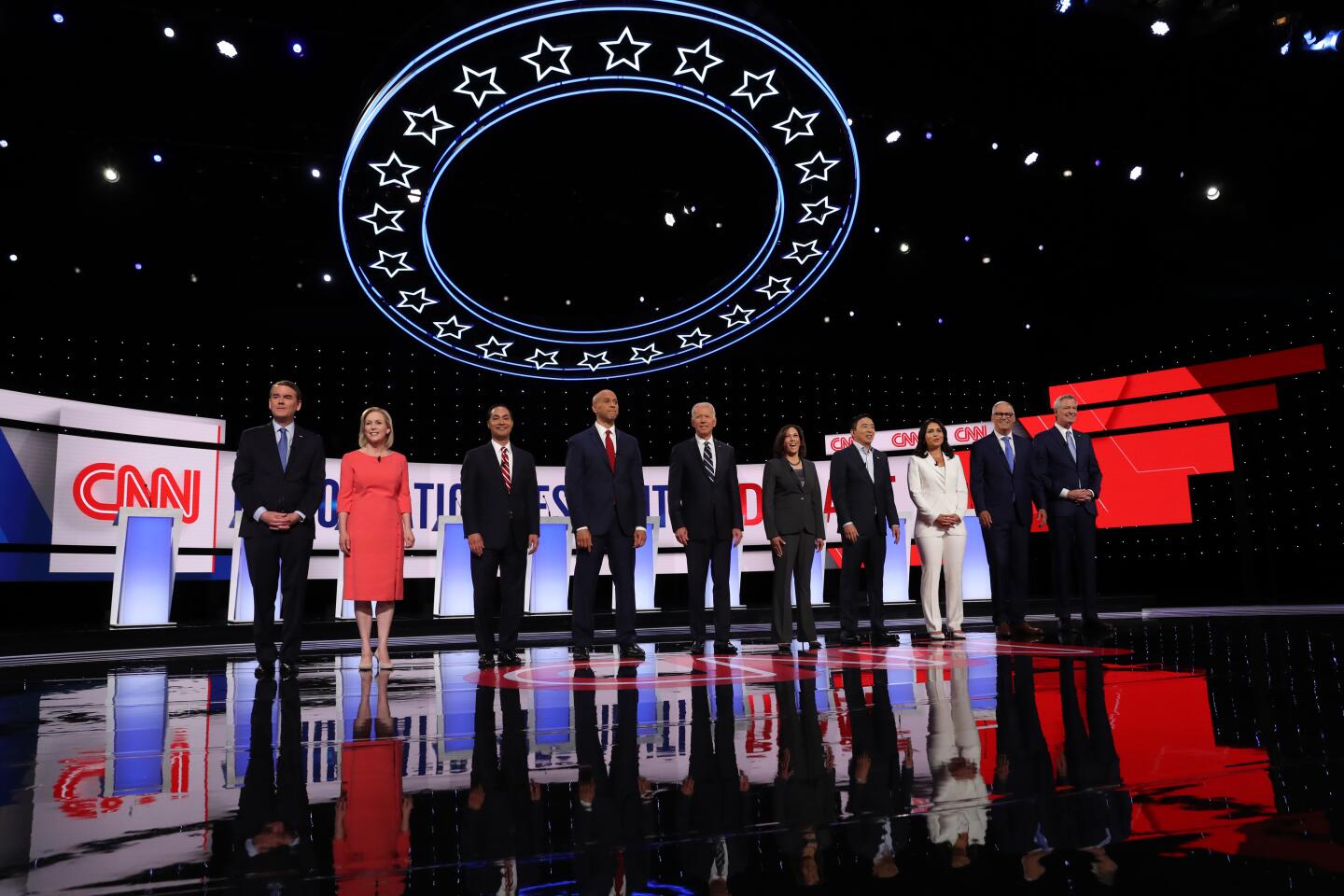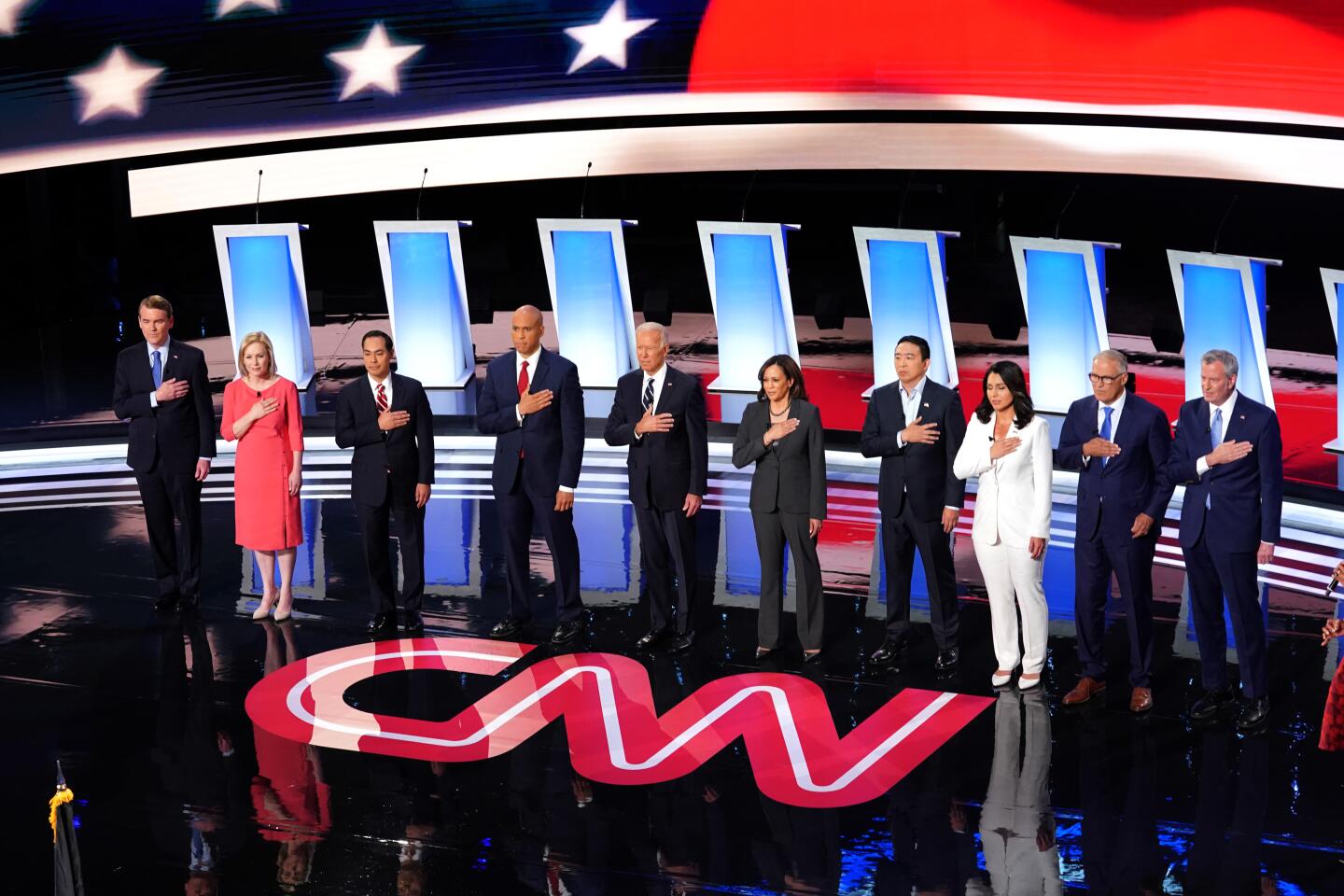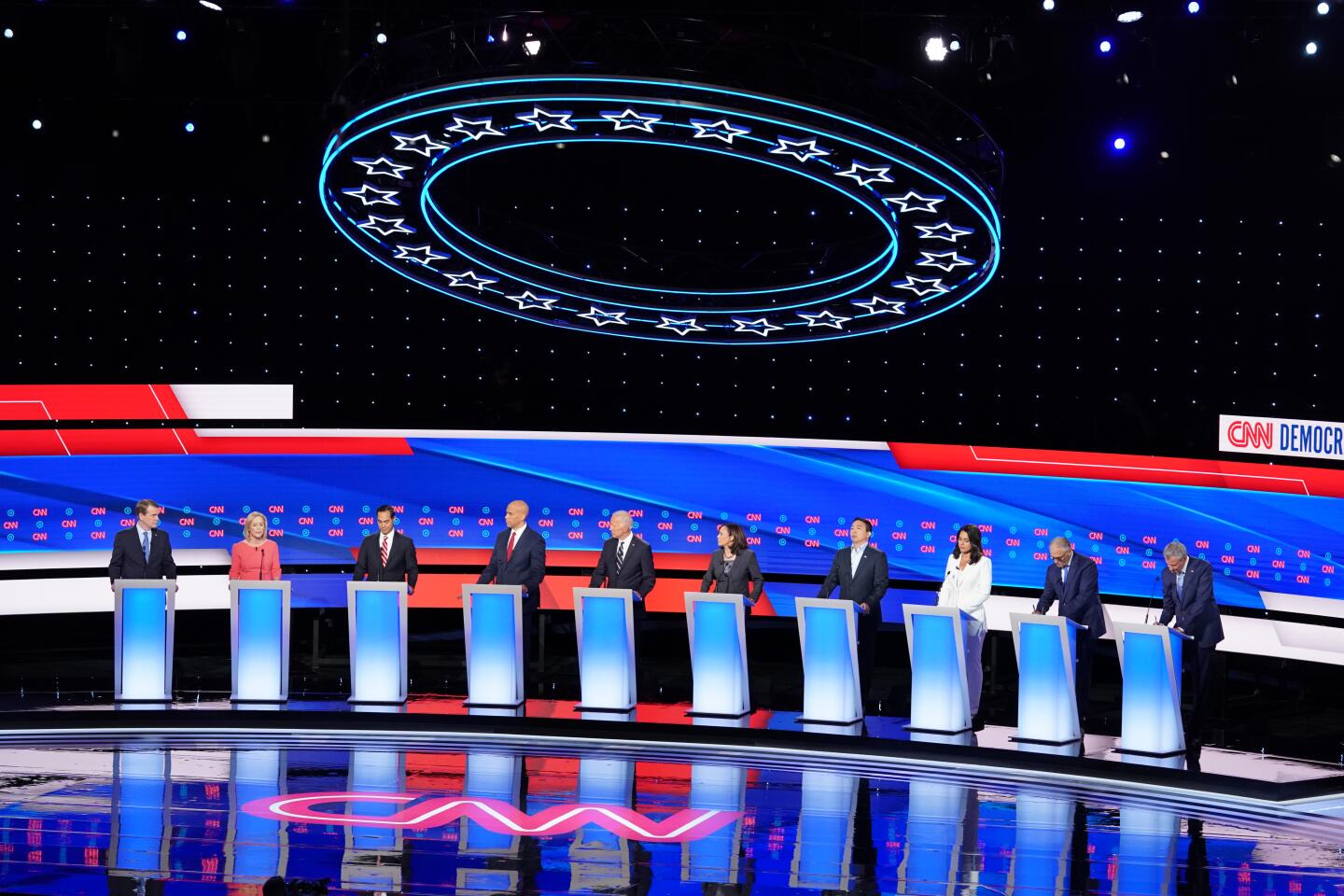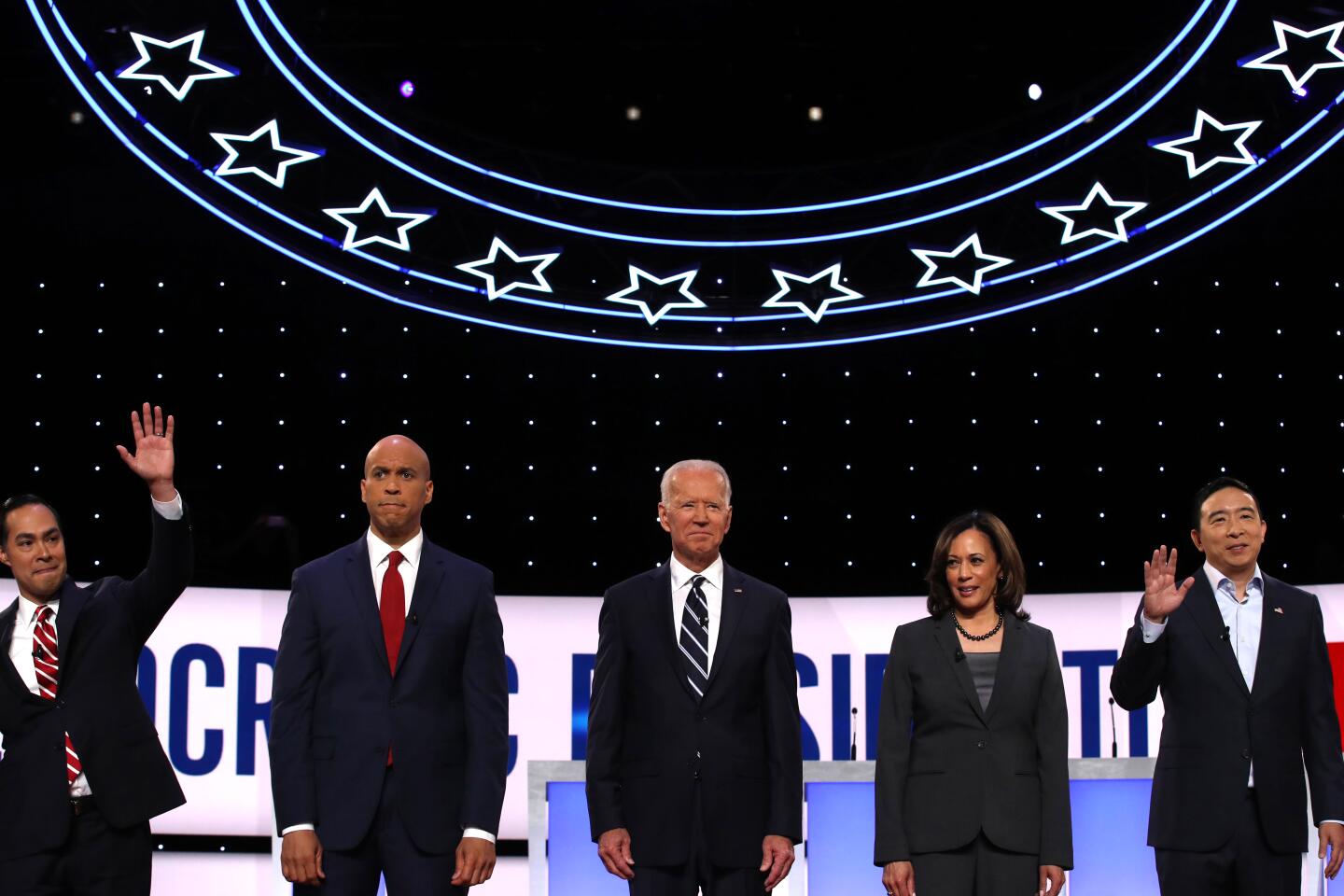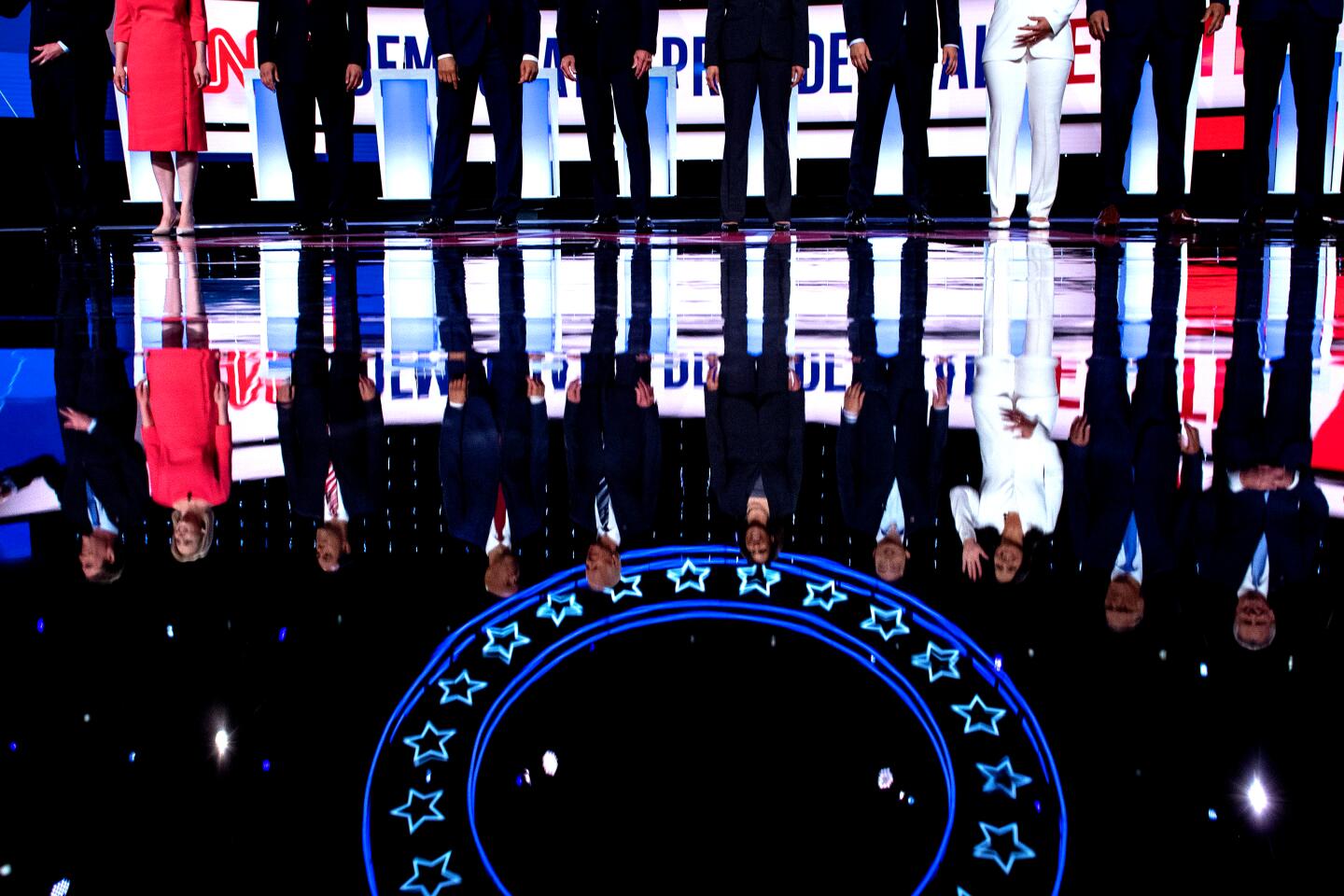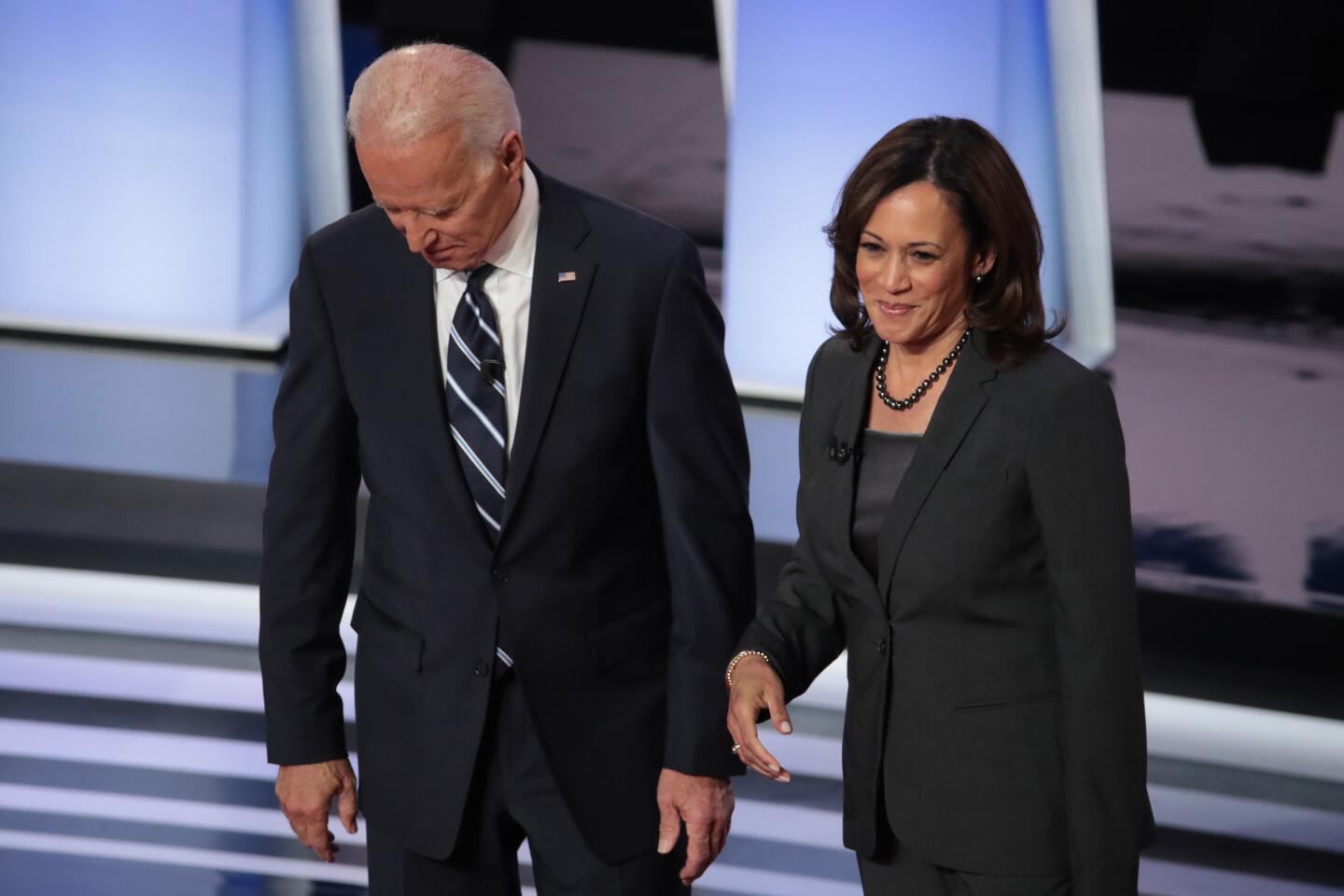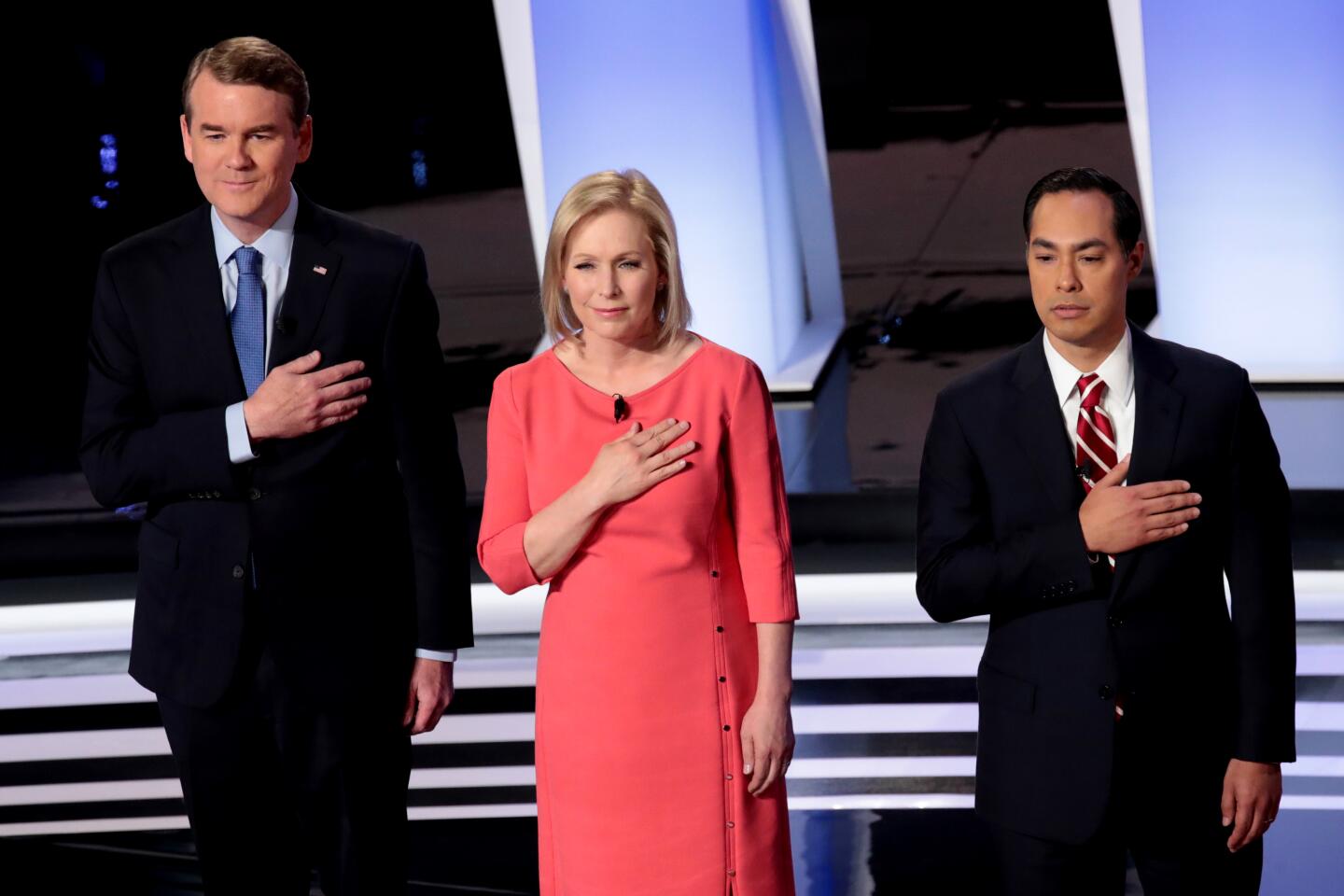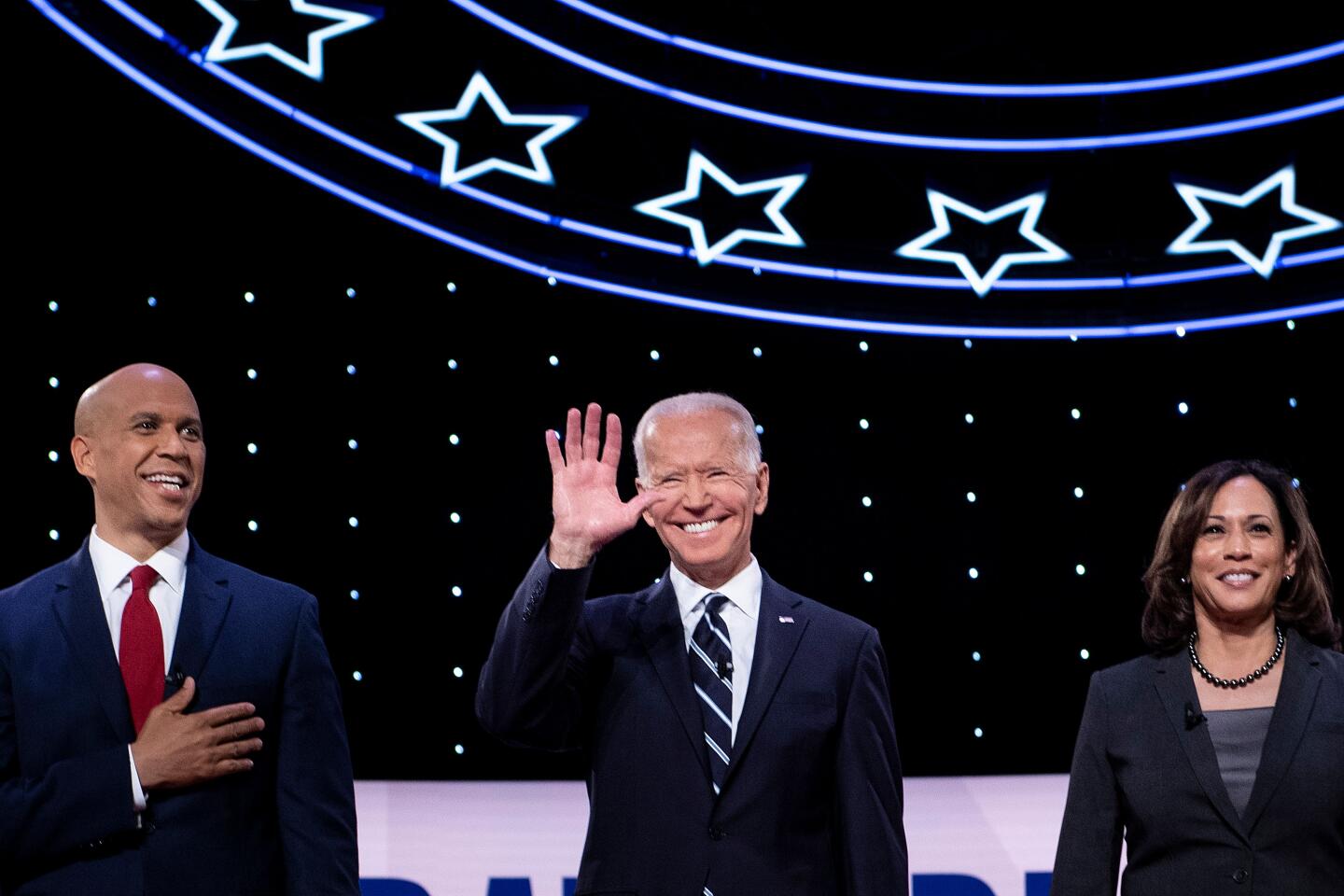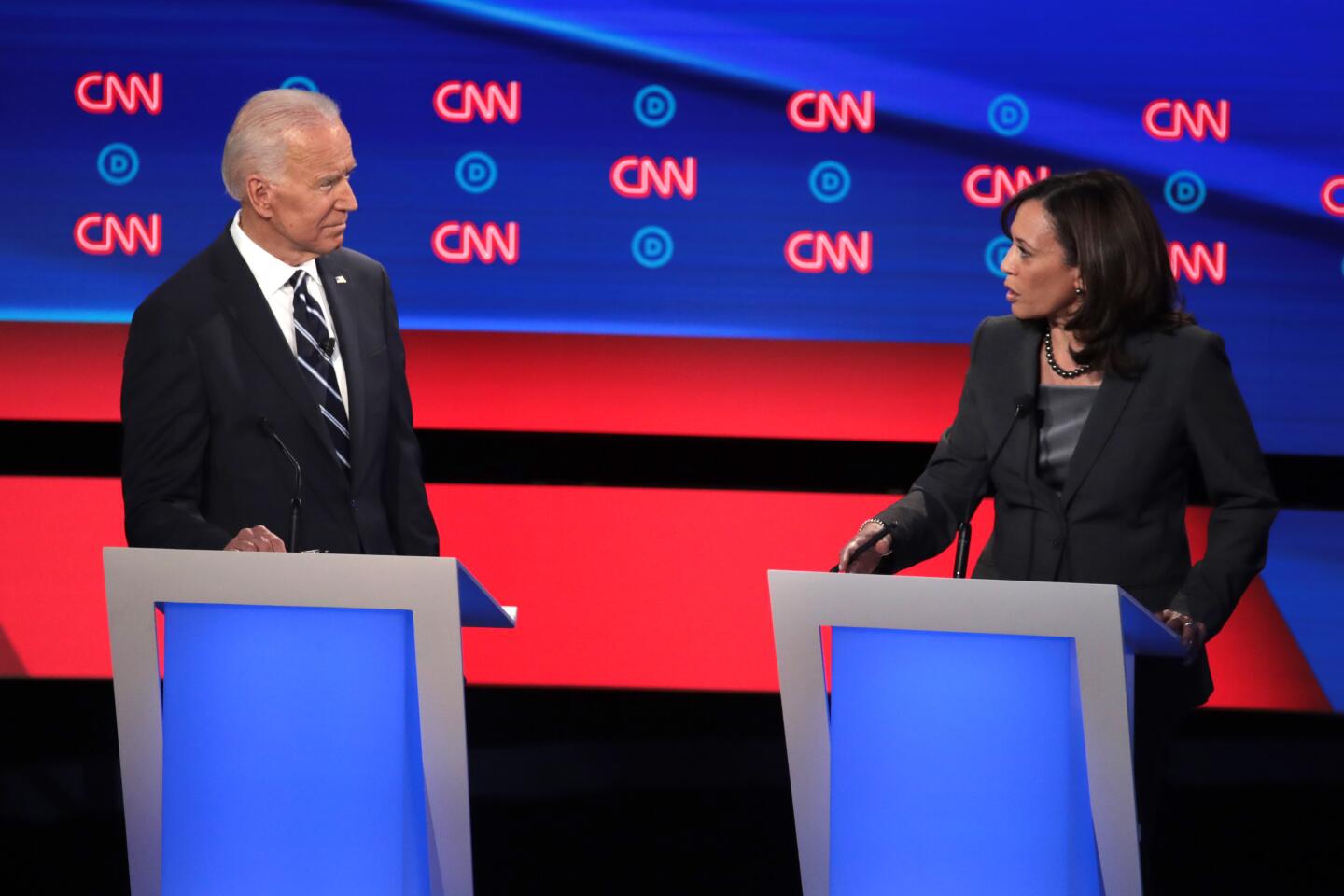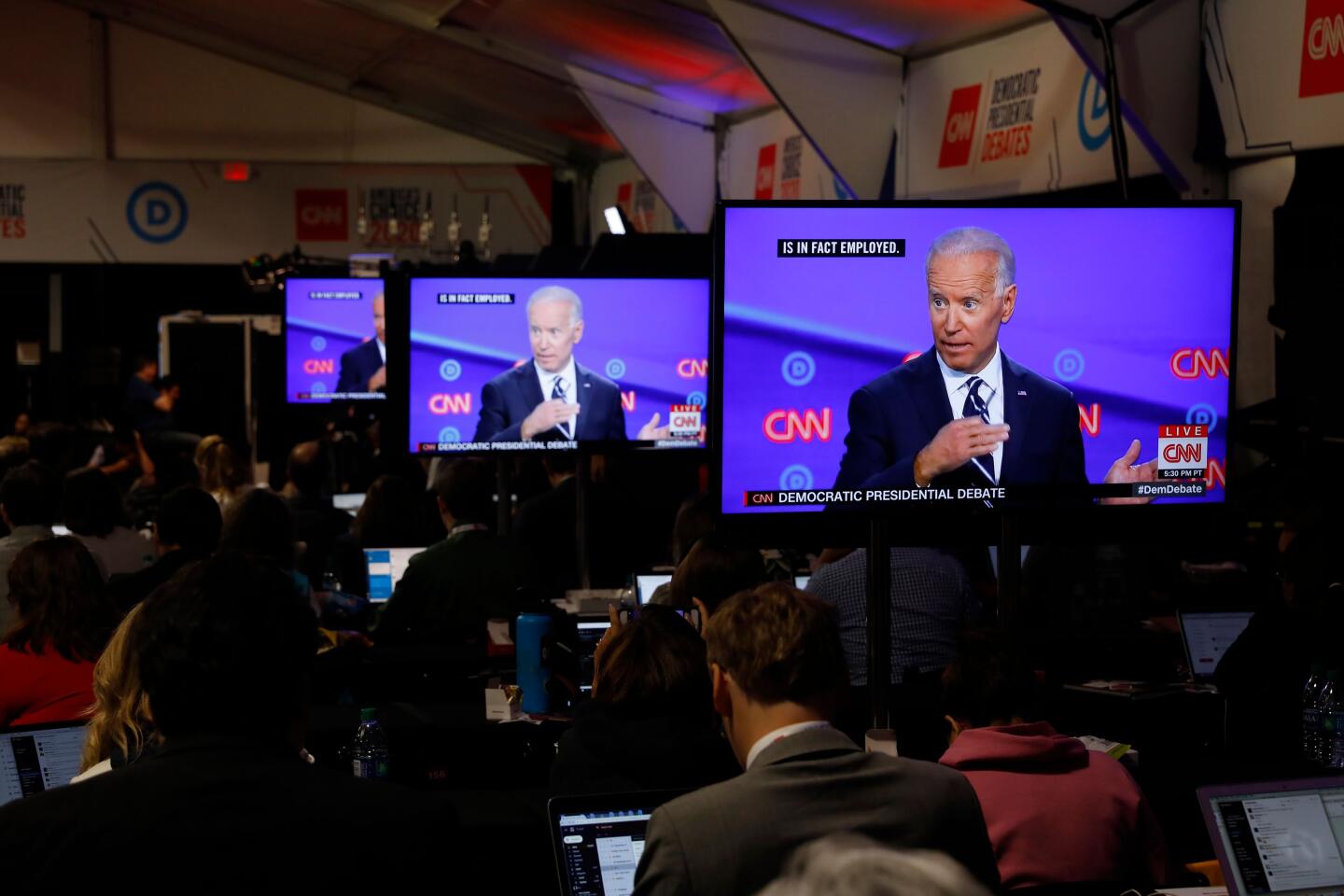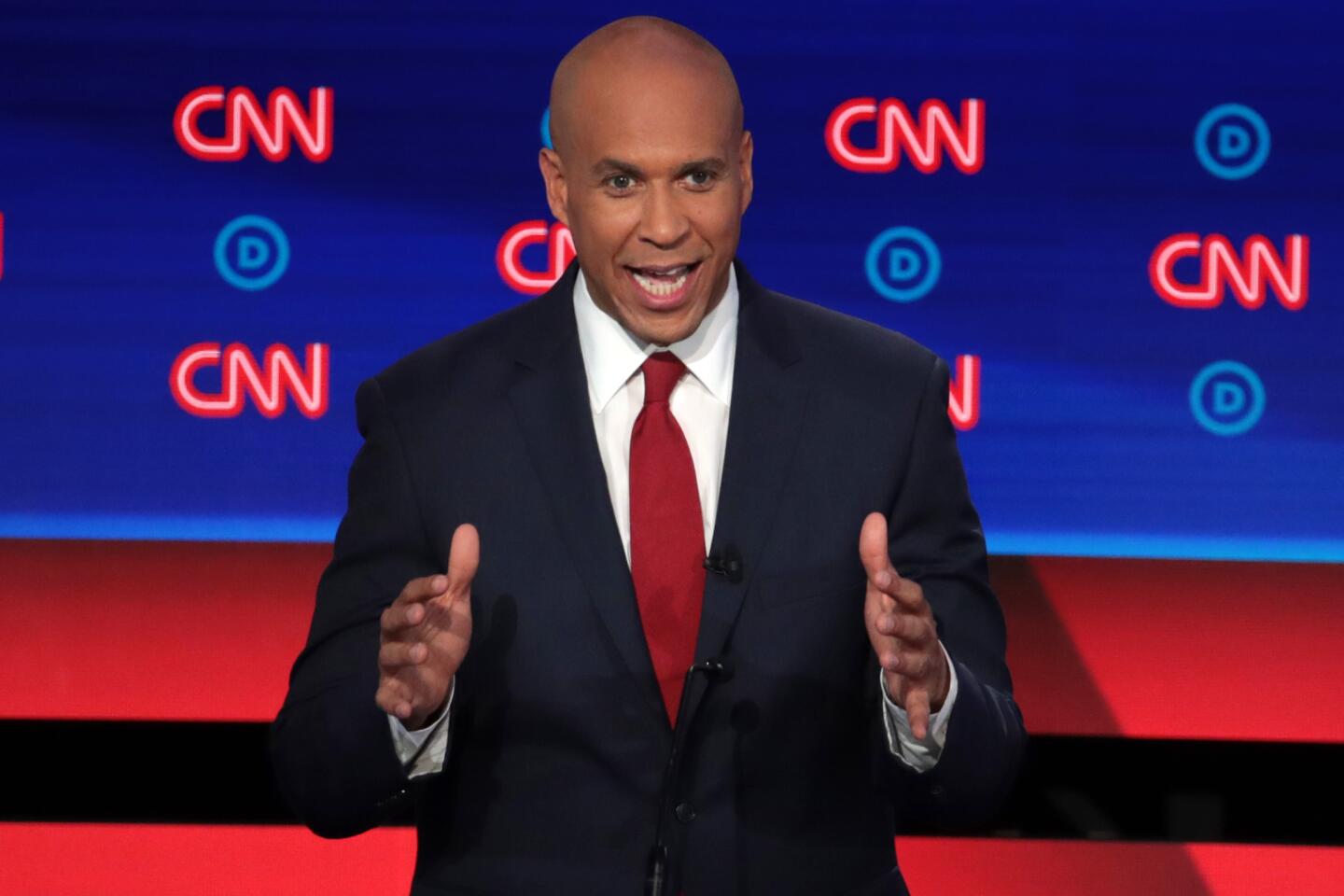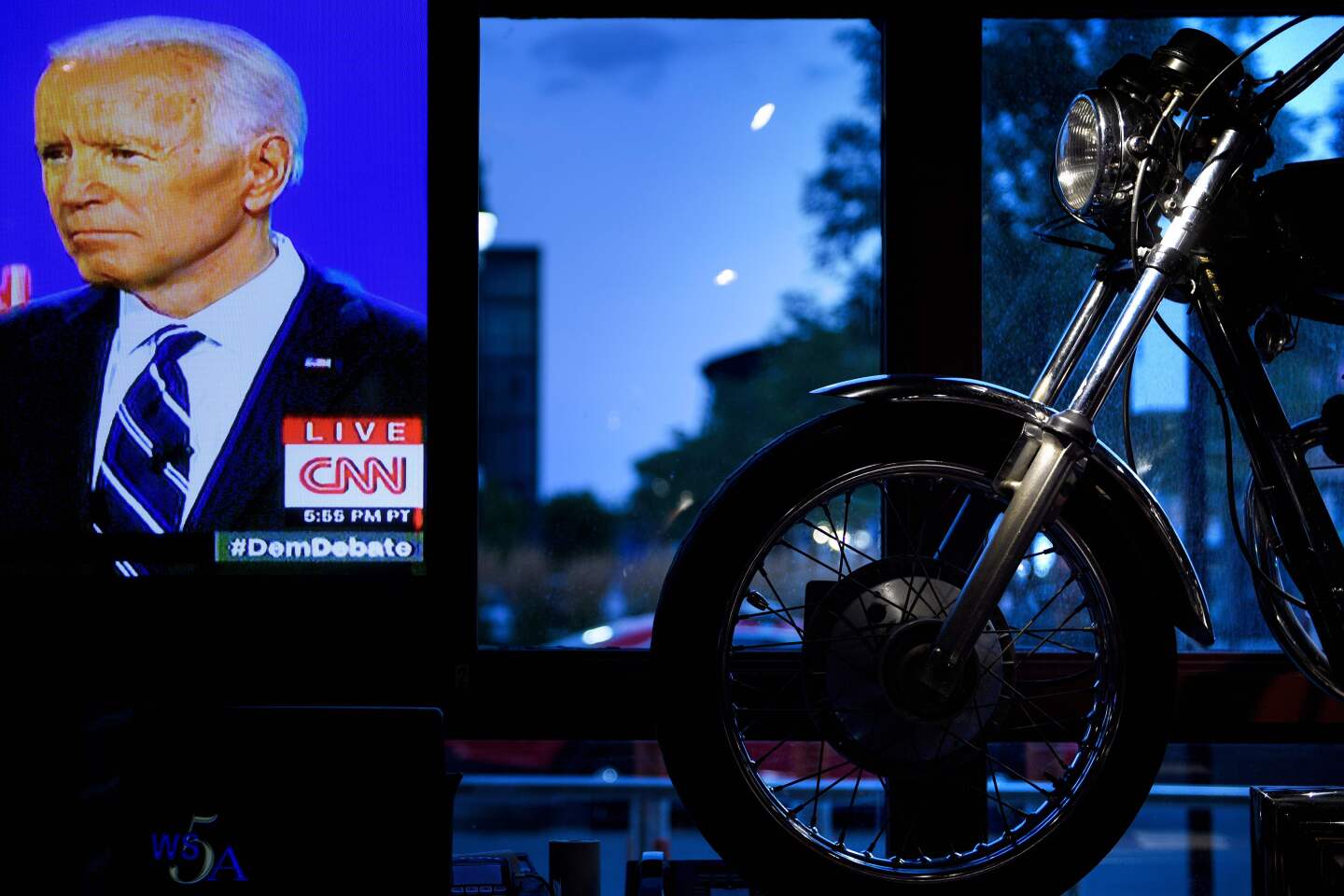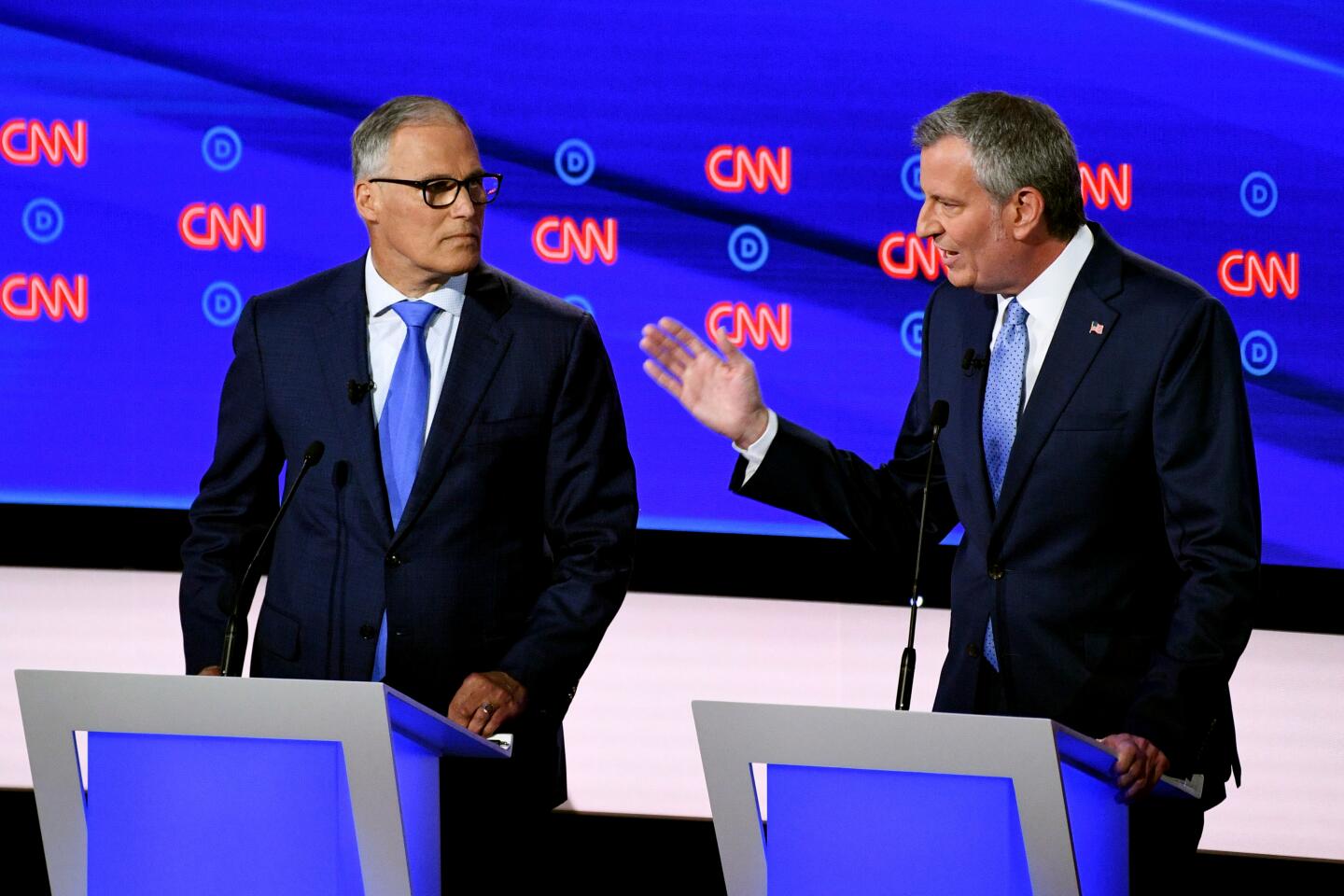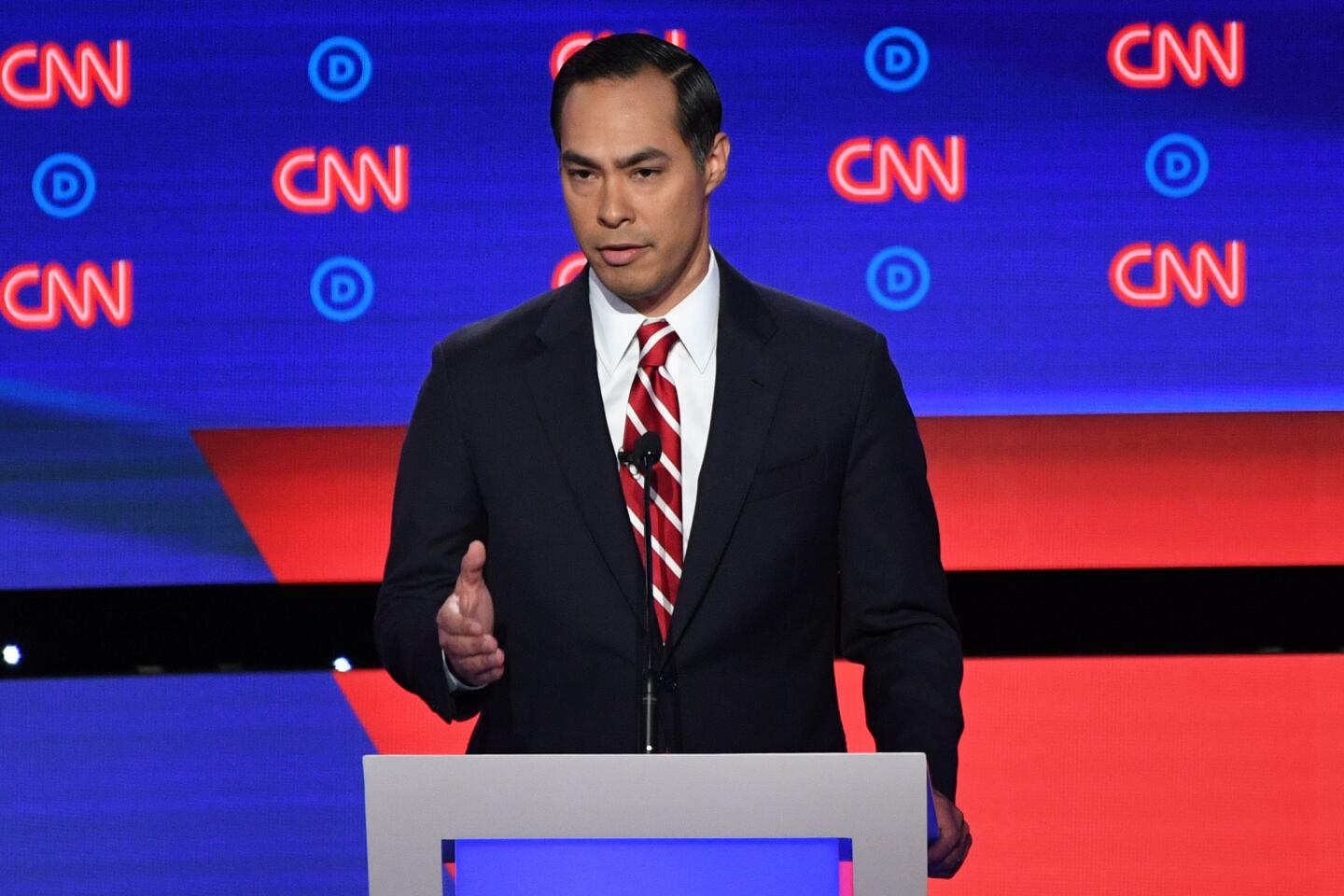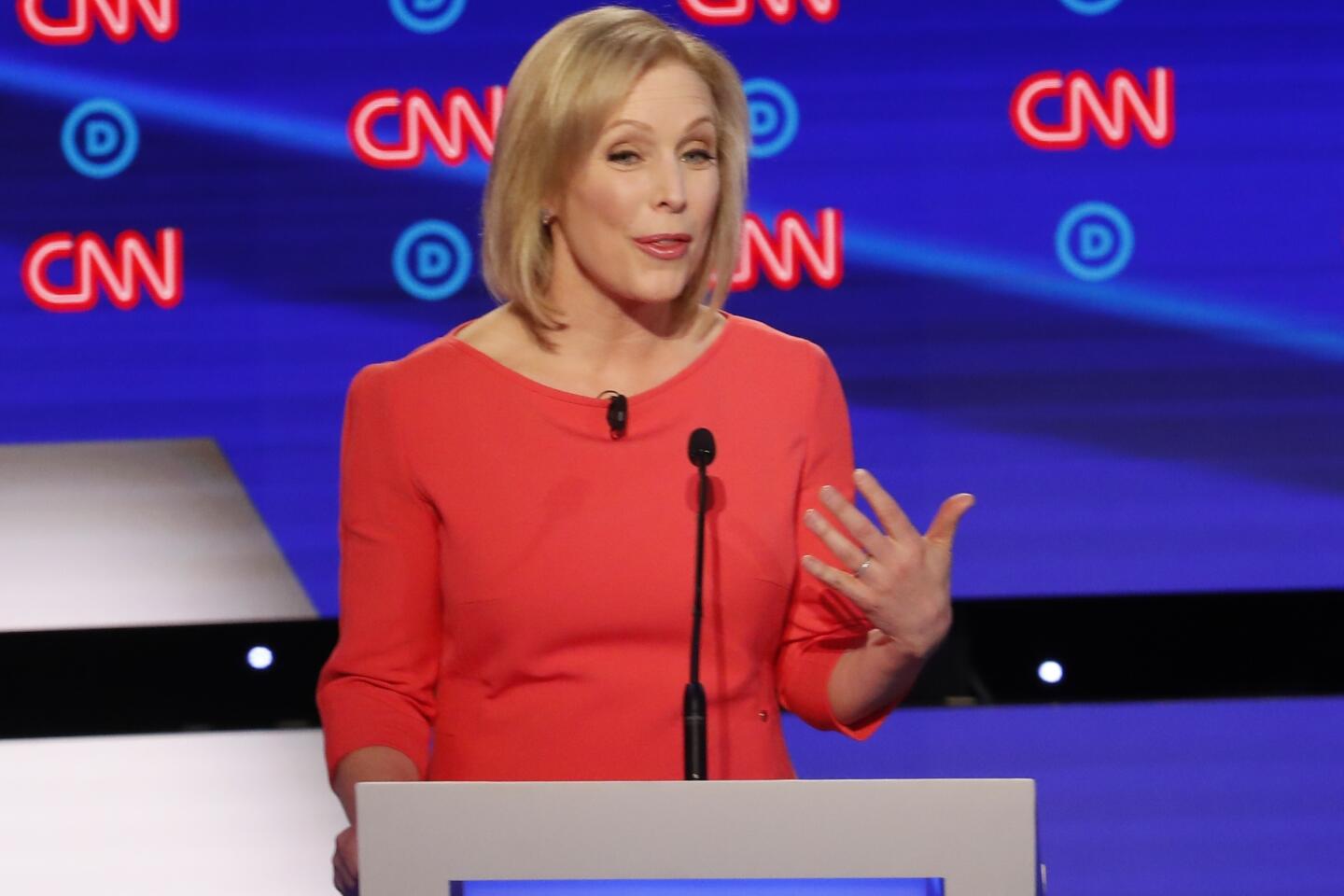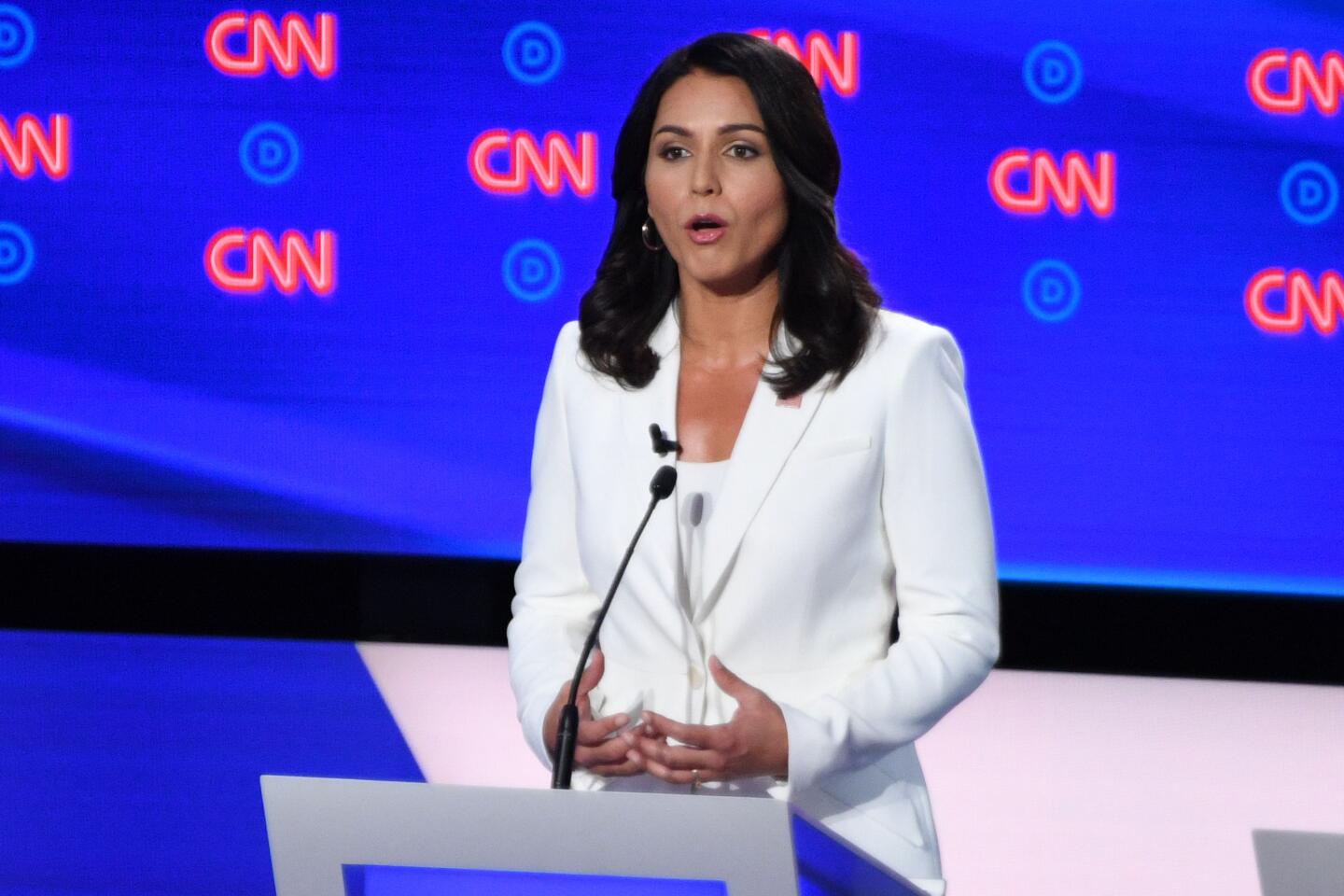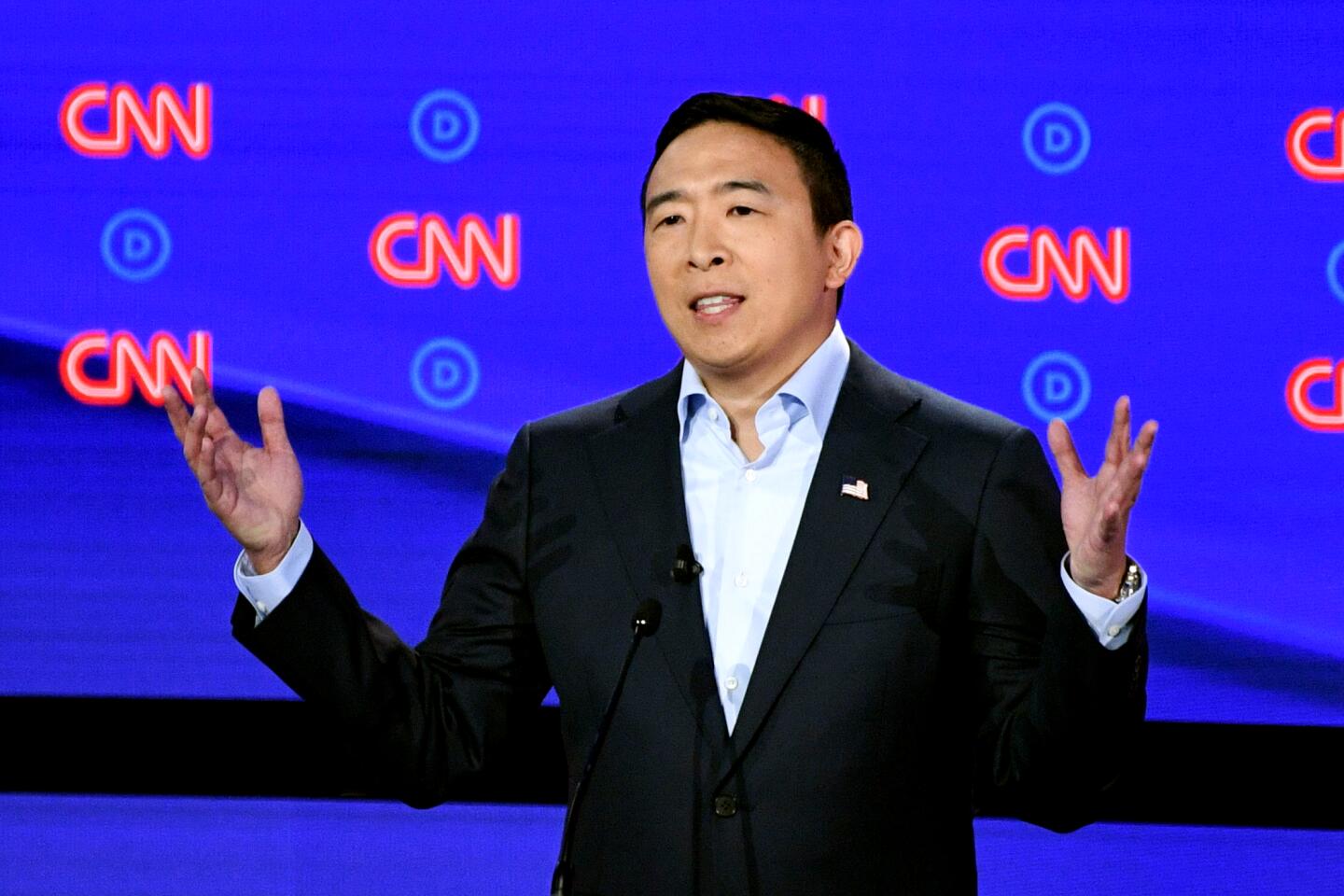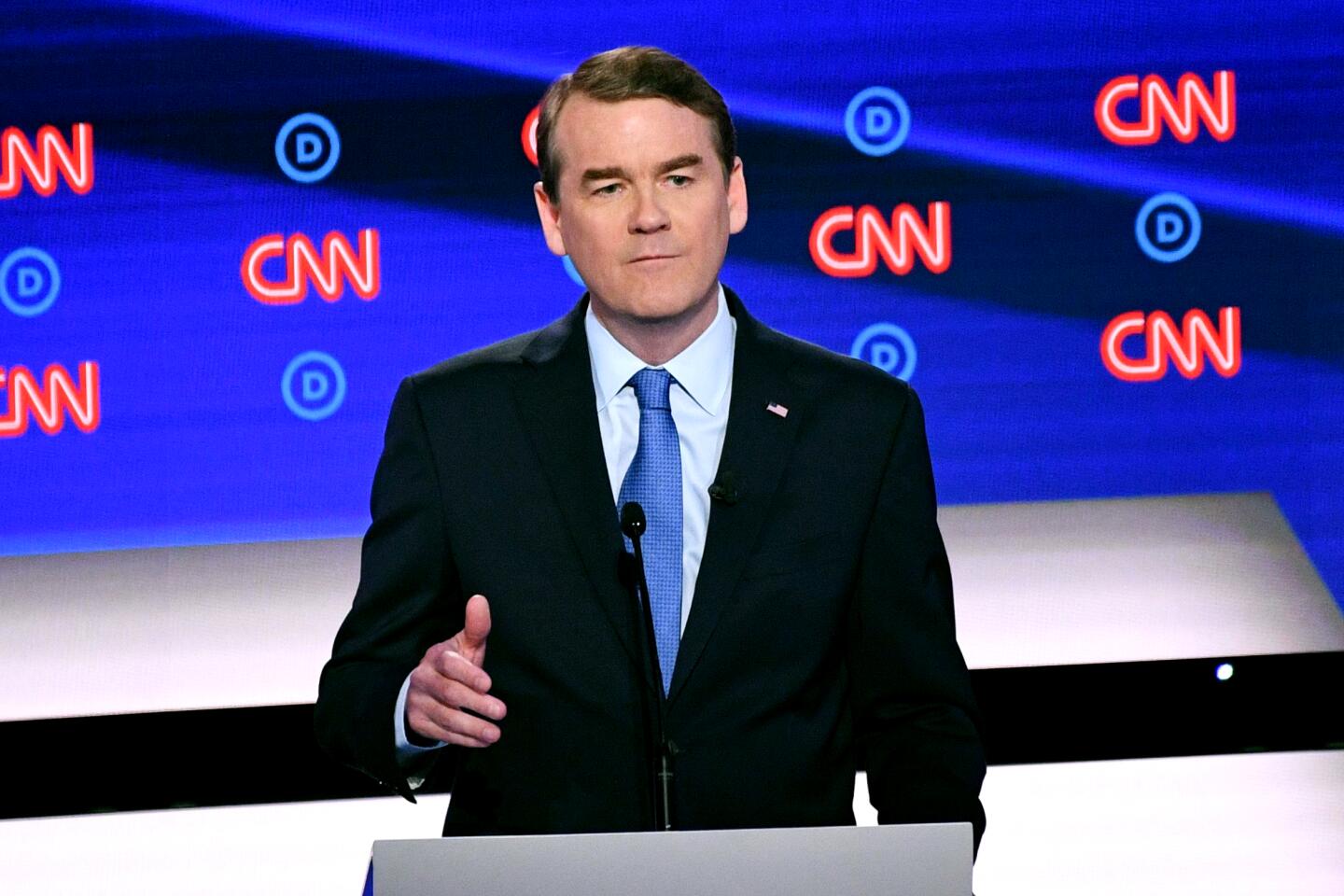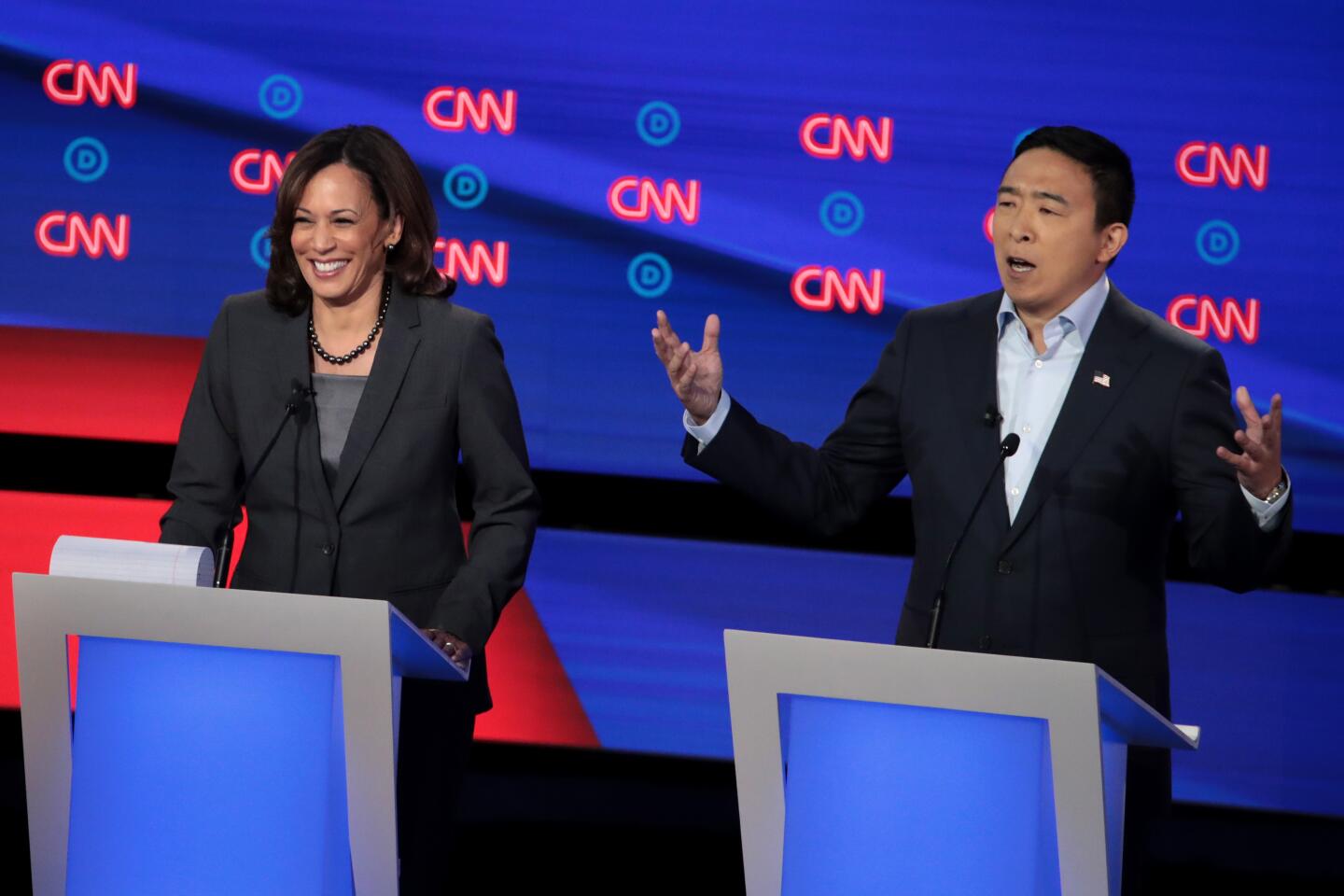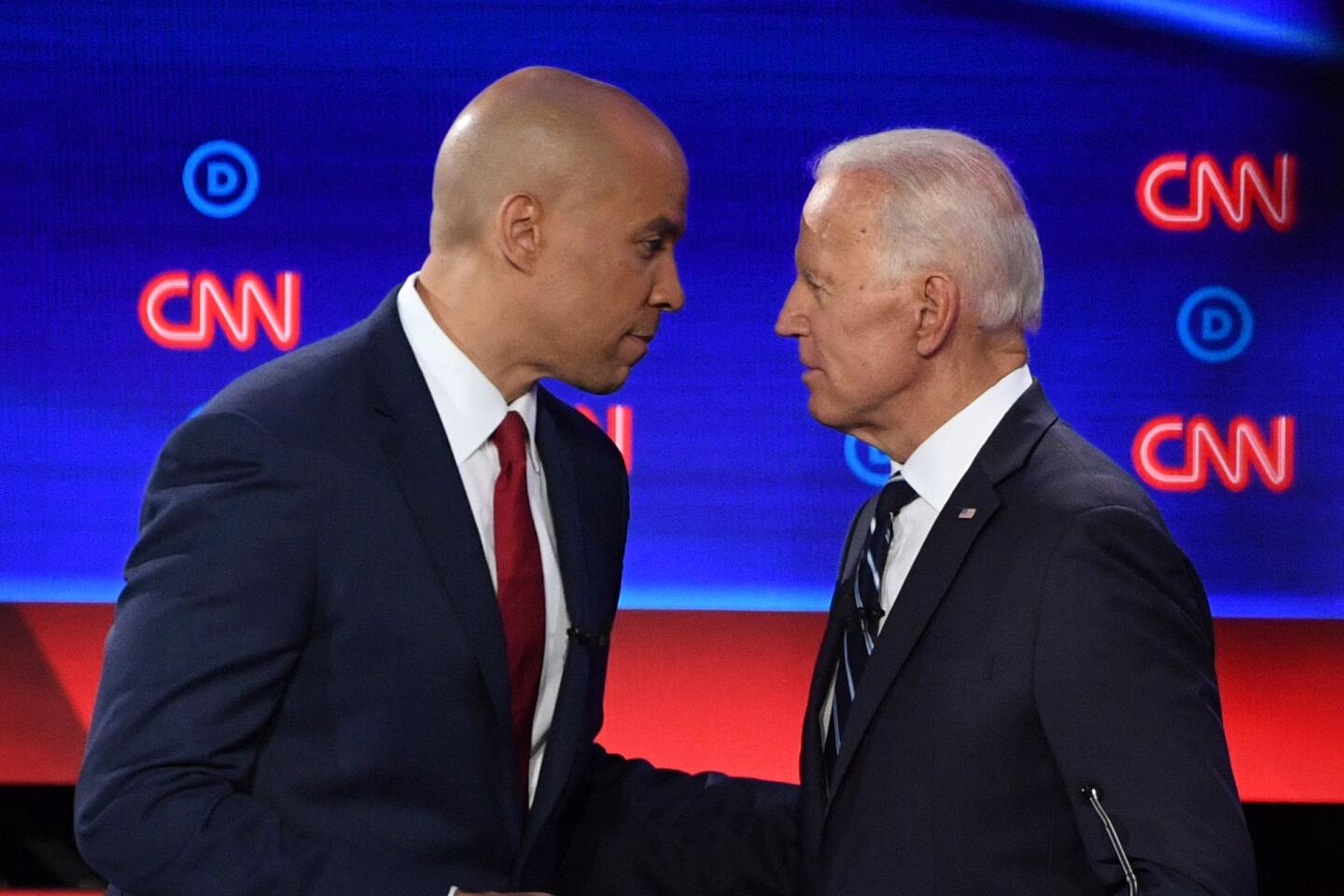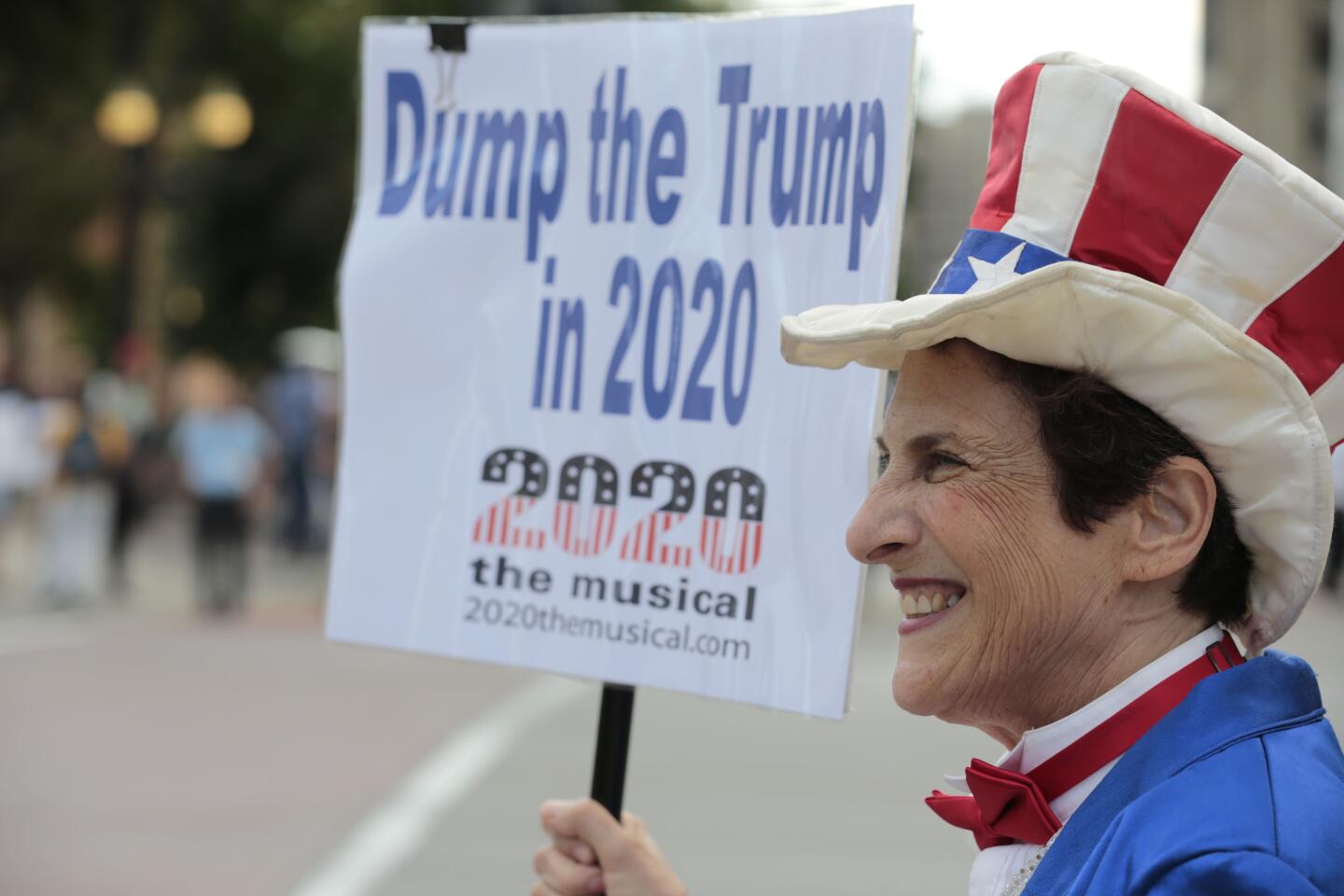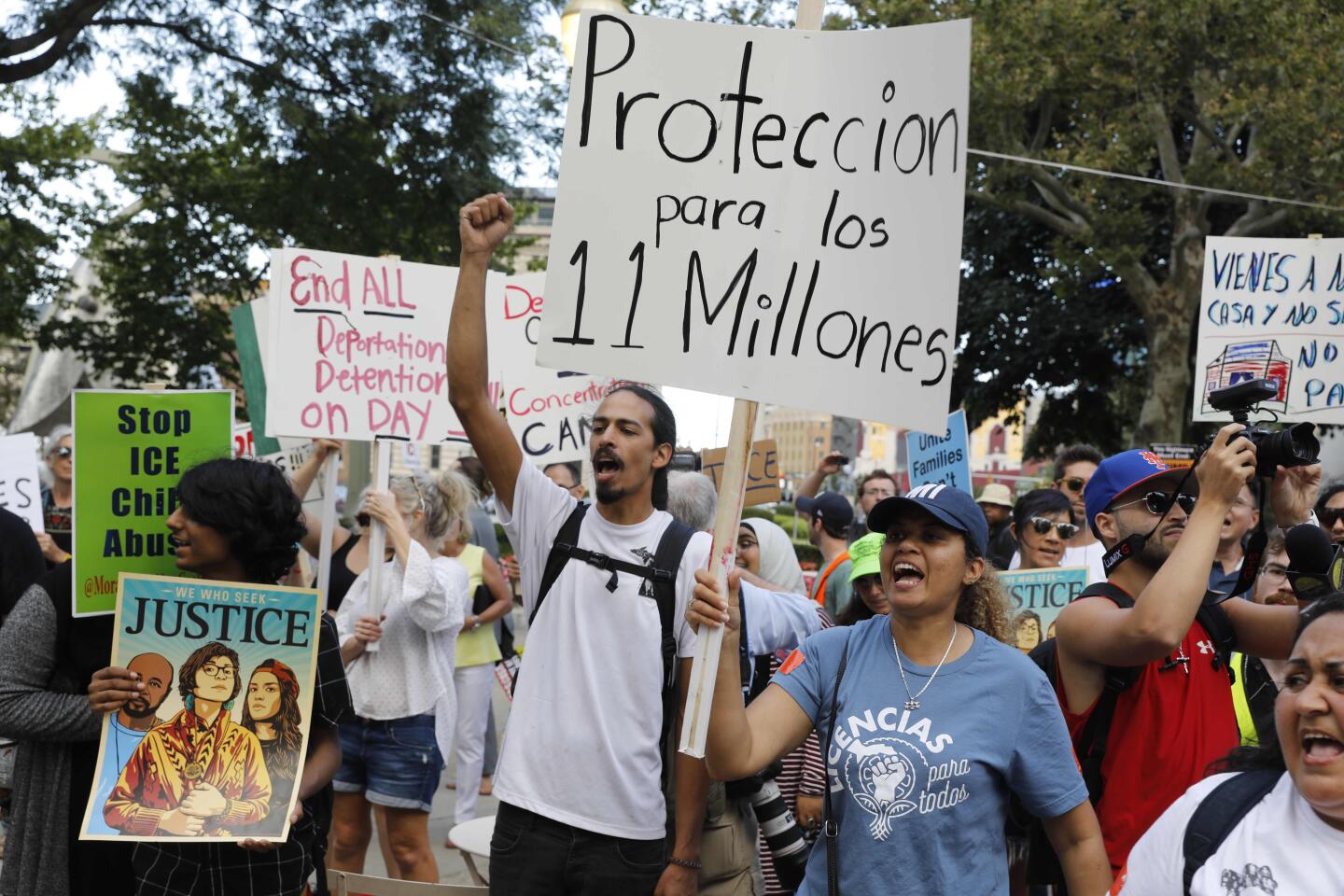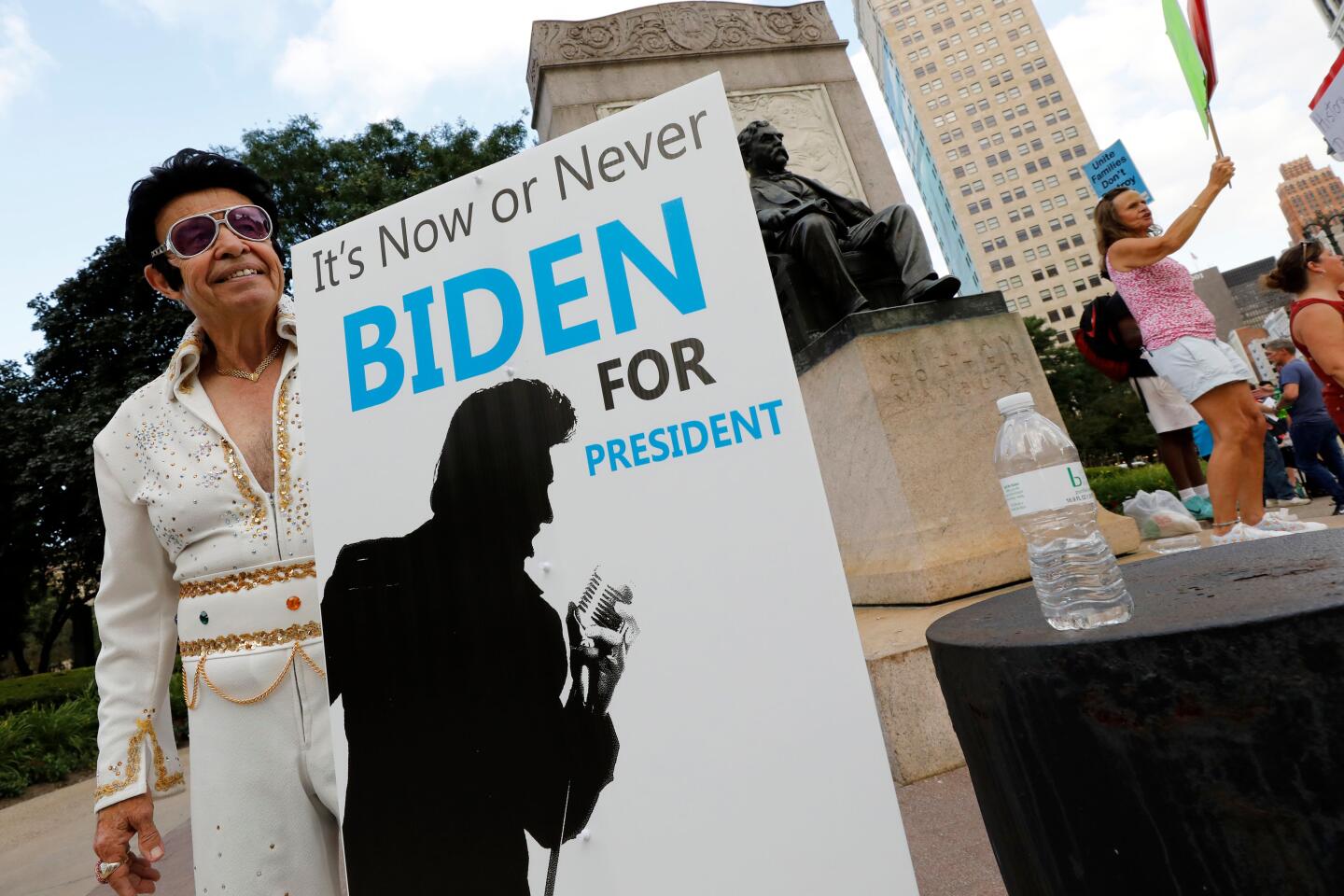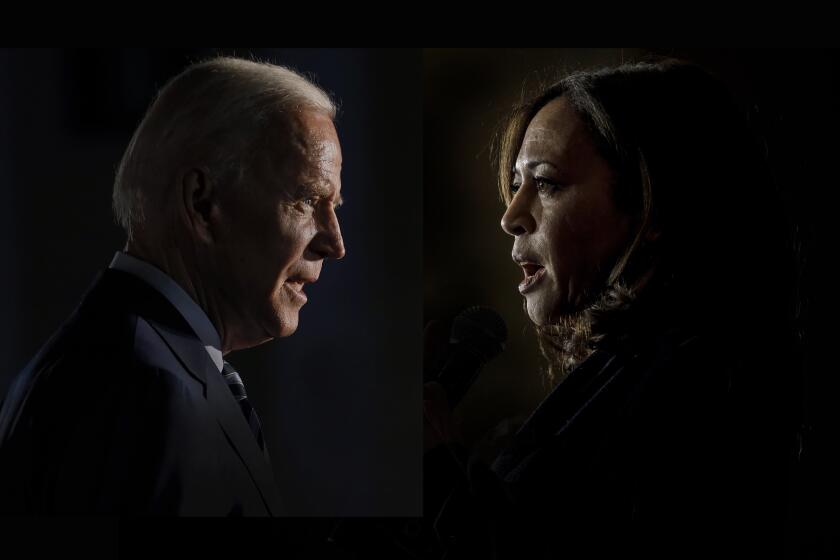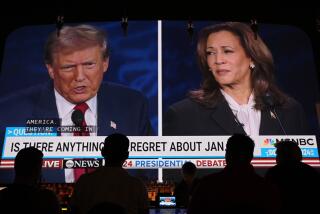Joe Biden takes fire from all sides in Democratic debate
DETROIT — The attacks on front-runner Joe Biden were unrelenting and, at times, personal in a contentious Democratic debate Wednesday night during which the former vice president delivered pointed retorts as he sought to convince voters that he is not an Obama-era relic, but the politician to revive the party.
The leading rivals sharing the stage with the more moderate Biden on Wednesday — California Sen. Kamala Harris and New Jersey Sen. Cory Booker — tangled with him on issues not just of policy, but of identity politics, as the two black lawmakers compete with him for African American voters, whose support is crucial to winning the nomination.
“There are people right now in prison for life for drug offenses because you stood up and used that tough-on-crime rhetoric that got a lot of people elected but destroyed communities like mine,” Booker said to Biden when the debate turned to mass incarceration.
“Mr. Vice President has said that, since the 1970s, every major crime bill — every crime bill, major and minor — has had his name on it. And, Sir ... this is one of those instances where the house was set on fire and you claimed responsibility for those laws.”
The tone of attack was no softer when candidates challenged Biden on healthcare and immigration.
“In 2019 in America, for a Democrat to be running for president with a plan that does not cover everyone, I think, is without excuse,” Harris said, as she ripped into Biden’s rejection of “Medicare for all” in favor of a plan to shore up Obamacare.
Biden entered the debate determined to stanch the losses he has endured in the polls in recent months as rivals attacked his nearly 50-year record in politics, highlighting his long-ago efforts to limit mandatory federal busing, expand incarceration for drug crimes and forge legislative partnerships with segregationists.
“Everybody is talking about how terrible I am on these issues,” Biden said. “Barack Obama knew exactly who I was… He chose me and he said it was the best decision he made.”
The battle at Detroit’s historic Fox Theatre was less of an ideological clash on the debate stage than the night before, where the rift between the centrists and left-flank stalwarts Sens. Bernie Sanders and Elizabeth Warren intensified. Wednesday’s encounter was more personal, with Biden’s rivals calling him to account for actions decades ago.
It was a night defined by feuding, and despite occasional efforts by candidates to bring the focus back to President Trump, the persistently bitter tone departed from the message of hope and unity Democrats went into the night seeking to project.
The former vice president lit into his critics onstage, building off the rebukes he had delivered toward Harris and Booker in the days leading up to the event, after the New Jersey lawmaker called him ill-suited to reform the criminal justice system, and the Californian — who was bused as a child — demanded Biden apologize for fighting against the practice. It was a sharp shift by a candidate who earlier in the race tried to take a front-runner’s posture of avoiding intraparty skirmishes.
Sen. Kamala Harris and former Vice President Joe Biden played defense, hecklers protested Bill de Blasio, and healthcare policy won the spotlight again.Here are our five takeaways from Night 2 of the debates in Detroit>>
Biden accused Harris of misleading the public about her Medicare for all plan’s cost and impact on health insurance. “To be very blunt and very straightforward, you can’t beat President Trump with double talk on this plan,” he said.
He later accused her of condoning abusive police practices while a California prosecutor, an attack that was joined by Rep. Tulsi Gabbard of Hawaii, who also took aim at Harris’ record as a prosecutor.
It was not an easy night for Harris. Biden was more prepared than in the first round of debates, when his response to her attacks was flatfooted, but he struggled to emerge from the scrum and present himself as uniquely presidential and visionary.
Biden had the most to lose Wednesday, but the stakes were high for all 10 candidates on stage. Harris, who has been rising in the polls — particularly in some crucial early states — was eager to show she is not just capable of the occasional viral moment but is positioned to go the distance and take on Trump.
Booker has struggled to gain traction despite chatter for years that he represented the future of the party. Several other politicians came to the debate at risk of falling out of the race altogether. Gabbard, Sens. Kirsten Gillibrand of New York and Michael Bennet of Colorado, Washington Gov. Jay Inslee and New York Mayor Bill de Blasio won’t make the debate stage in September without a lift in the polls and infusion of donors.
They looked for openings for the kind of moment former Housing Secretary Julián Castro had in the June debate in Miami, when he rocketed out of obscurity by pillorying fellow Texan and former U.S. Rep. Beto O’Rourke for not embracing Castro’s call to decriminalize unauthorized border crossings. On Wednesday, Castro confronted Biden, who also disagrees with him on that issue.
“It looks like one of us has learned the lessons of the past and one of us hasn’t,” he told Biden. “What we need are politicians that actually have guts on this issue.”
Former Vice President Joe Biden was pressured to answer for deportations under the Obama administration.
De Blasio pressed Biden on whether he did anything to try to dissuade President Obama from pursuing mass deportations while in office. Biden refused to reveal private conversations with Obama. “I expect you would go ahead and say whatever was said privately with him,” Biden said. “That’s not what I do.”
Booker pounced. “Mr. Vice President, you can’t have it both ways,” he said. “You invoke President Obama more than anybody in this campaign. You can’t do it when it’s convenient and then dodge it when it’s not.”
Booker went on to criticize Biden after the ex-vice president said immigrants with a PhD degree should automatically get green cards letting them stay in the United States for seven years.
“Well that’s playing into what the Republicans want — to pit some immigrants against other immigrants,” Booker said, and then alluded to Trump’s reported description of some African nations. “Some are from ‘shithole countries,’ and some are from worthy countries.”
The exchange on healthcare was equally heated. “You will lose your employer-based insurance,” Biden said of the Harris plan.
He was playing to the political sensitivities of the issue because more than 150 million Americans currently have job-based health coverage, and many are wary of change, polls show. But Harris counterpunched by saying Biden’s plan, which would build on the existing Affordable Care Act, would still leave millions of Americans without affordable healthcare coverage.
“We will ensure that everyone has access to healthcare,” Harris said.
The challenge of satisfying progressives who want transformative change in the nation’s healthcare system and moderates anxious about losing choice has proved particularly tricky for Harris. Her vision for achieving universal healthcare went through various iterations — and some contradictions — until she unveiled a detailed plan days ago. “The senator has had several plans so far,” Biden said.
When attacked on his criminal justice record, Biden shot back with criticism of Booker’s tenure as mayor of Newark, N.J., over allegations of abuse in the city’s police department and its stop-and-frisk practices. Booker said he inherited a troubled department, but that his record compares favorably with Biden’s heavy hand in federal anti-crime policy. He said he was “shocked” that Biden wanted to compare records on the issue, and called the attacks on his Newark record ill-informed.
“There is a saying in my community,” Booker said to Biden. “You’re dipping into the Kool-Aid and you don’t even know the flavor.”
Just as Biden attacked Booker’s record in Newark to deflect attention from his own work on criminal justice issues, he turned to Harris’ past when the issue of his history with busing came up. Biden said he supported busing that was court-ordered, as well as voluntary busing, which was the type of integration effort the Berkeley school Harris attended as a child used. He argued that his position on the issue is not dissimilar to hers.
“That is simply false,” Harris said. “When Vice President Biden was in the United States Senate working with segregationists to oppose busing, which was the vehicle by which we would integrate America’s schools, had I been in the United States Senate at that time, I would have been completely on the other side of the aisle.”
Biden didn’t respond directly to these attacks, instead turning to Harris’ record as attorney general of California. “There were two of the most segregated school districts in the country, in Los Angeles and in San Francisco, and she did not — I didn’t see a single solitary time she brought a case against them to desegregate,” he said.
Biden’s rivals also challenged him over his plans to combat climate change, with Inslee calling them “middling.”
“Too little, too late,” Inslee said, noting he visited a neighborhood in west Detroit this week located next door to a petroleum refinery where residents have experienced high levels of asthma and other illnesses.
Biden said his plan would eliminate the use of fossil fuels and create 500,000 electric-car charging stations. By 2030, he said, the country would move to all electric vehicles. While working toward those goals, he’d bring world leaders together to discuss other long-term solutions.
“We have to walk and chew gum at the same time,” Biden said. Gillibrand took a lighter approach, saying the first thing she’d do as president to clean up the environment is “Clorox the Oval Office.”
But the most clever line of the night may have come from New York entrepreneur Andrew Yang, a political neophyte whose tech-savvy focus on the threat automation poses to the American worker and plan to provide every American adult a “guaranteed basic income” of $1,000 per month, paid for by government, has won him more donors and voter support than several of the prominent politicians on the stage with him.
“We need to do the opposite of much of what we’re doing right now,” Yang said, introducing himself to the audience of millions, “and the opposite of Donald Trump is an Asian man who likes math.”
Halper reported from Washington and Mehta and Beason from Detroit. Times staff writers Janet Hook and Noam N. Levey in Washington and staff writers Michael Finnegan and Matt Pearce in Los Angeles contributed to this report.
More to Read
Get the L.A. Times Politics newsletter
Deeply reported insights into legislation, politics and policy from Sacramento, Washington and beyond. In your inbox three times per week.
You may occasionally receive promotional content from the Los Angeles Times.
